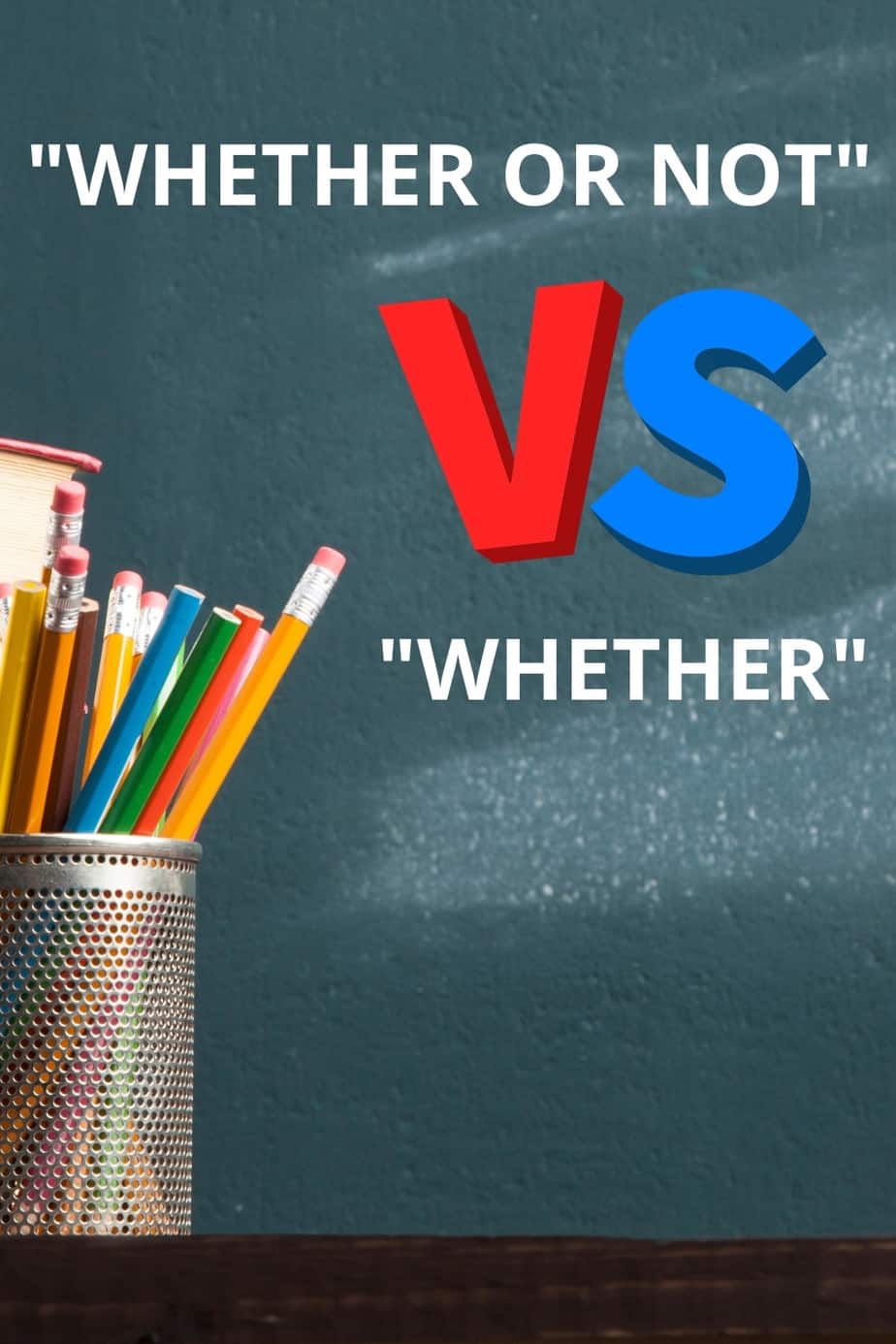When and how do we use “whether”? Is the “or not” in “whether or not” even necessary?
Although it seems a bit odd, it is natural to ask these tricky questions occasionally.
Given all the deceptive rules in any language’s grammar, perhaps only Mr. Chomsky isn’t having troubles like this.
Well, there’s no need to fret. Let’s get right into understanding the peculiarities behind these conjunctions.
Whether or not vs. whether
Use “whether or not” to emphasize an outcome’s inevitability regardless of certain conditions. Use “whether” to indicate multiple possible outcomes without added emphasis. The choice between the two depends on the level of emphasis you want to convey in your statement.
The conjunction “whether” has a synonymous meaning with “which or either of the two.”
This means that it implies a dichotomy of two options implied within the constructed sentence.
Its main role is to provide a binary choice to the hearer or reader which is, apparently, more formal and polite in most cases.
Conversely, we may blatantly use “whether or not” when we want to limit or manipulate the result of whatever we want to achieve.
Therefore, the decision of whether to use “whether or not” or “whether” alone is dependent on the language user’s intention or purpose.
To make the distinction clearer, let’s take a closer look at some examples, particularly in declarative sentences.
Examples of “whether or not” in a sentence
It is best to use “whether or not” in cases when we want to imply the meaning of regardless, despite, or notwithstanding.
In particular, this happens when the writer or speaker’s intention is to apply conviction on the desired result.
Moreover, it is useful when we want to clarify the desired outcome and persuade the other party involved.
Here are some examples to illustrate the explanation provided.
The example sentence elicits the subject’s conviction to achieve the intended action of going to the mentioned event.
It further implies that the subject is not asking for permission but merely informing the desired action instead.
To make things clearer, here’s one more sentence using “whether or not.”
The sentence above similarly represents the subject’s finality of decision without the intention of considering the other person’s opinion.
Hence, “whether or not” is vital in circumstances that require persuasion, as well as for conveying conviction or finality of a decision.
Examples of “whether” in a sentence
Contrary to the purpose of “whether or not,” we use “whether” alone when at least one of the implied or provided options is possible.
On one hand, “whether or not” implies conviction; on the other, “whether” denotes uncertainty toward the options.
We likely use “whether” when we want to seek advice, a second opinion, or confirmatory details based on assumptions.
In the sentence above, the subject is unable to decide which of the two mentioned actions to take.
Also, it implies half-heartedness and self-doubt toward the intended result.
Once again, to see the distinction from the former variation discussed, here’s one more example sentence.
The subject in the above scenario is seeking advice based on the two available options, which is common when the course of action is risky.
Ergo, using “whether” is beneficial in cases wherein we are quite uncertain which action to take, as opposed to having a sense of confidence toward it.
In which kind of sentences will “whether or not” and “whether” work?
Now that the basic senses have been laid out, it is also essential to understand some syntactical background regarding the topic.
In brief, “whether or not” is possible when the clause modifies the verb in the sentence while still maintaining the meaning of “regardless.”
“Whether” is applicable in sentences when the clause functions as the object or the verb, object of the preposition, or the subject of the sentence.
Whereas, both expressions work in sentences wherein only one option is provided and are replaceable with “if.”
In which kind of sentences is “whether or not” possible?
As elaborated earlier, using “whether or not” is essential when conveying the meaning “regardless of whether” for persuasion and conviction reasons.
Syntactically speaking, this can be true when the clause introduced by “whether or not” modifies the main verb in the sentence.
“Whether or not” functioning as a verb modifier
In the sentence below, the whether-clause modifies the main verb which is “will finish.”
In which kind of sentences is “whether” possible?
“Whether,” on the other hand, is more flexible than the former expression.
This is more appropriate in cases wherein the clause it introduces functions as the object of the verb, the object of the preposition, and the subject of the sentence.
“Whether” clause functioning as the object of the verb
In the next example, the whether-clause is the direct object, which answers the question of “what the subject does”, of the simple past verb “asked.”
“Whether” clause functioning as the object of the preposition
In this example, the whether-clause is used as the object of the preposition “about”, which can either be a noun or pronoun.
“Whether” clause functioning as the subject of the sentence
In the following example, the whether-clause is used as the subject of the sentence, a noun, that is followed by the predicate.
In which kind of sentences will both “whether or not” and “whether” work?
Technically, the “or not” part is optional for as long as the clause only presents one option and is replaceable by “if.”
One thing to note, though, is that changing the conjunction into “if” would transform the sentence into a conditional one, which could be interpreted as less formal than using “whether [or not].”
While using “whether [or not]” implies a binary choice, using “if” would make the sentence more assumptive, and hence, limiting the implication even further.
When only one option is provided and can be replaced with “if”
In the example below, dropping or including “or not” will not necessarily hurt the grammaticality of the sentence when used both in written and spoken English.
Although this might attract the attention of grammar pedants, this means that native speakers will not misunderstand the meaning of the sentence.
Therefore, there is nothing to worry about if you keep using this structure.
The most important thing to bear in mind is not to add another option introduced by the conjunction “or” afterward.
Remember that deliberately adding another option omits the “or not” function in the sentence, thereby necessitating “whether” only.
“Whether or not” vs. “Whether” in questions
Use “whether or not in questions to draw emphasis to both the affirmative and negative choices. Use “whether” in questions when the intention is simply to seek some information.
To see them more clearly, here are some examples.
Using “whether or not” in questions
When the question is propelled by some intense emotion for some reason, we could blatantly emphasize the negative option to increase the authority.
Using “whether” in questions
Again, in presenting two different options, such as the two schedules in the next example, the words “or not” are inessential.

Frequently Asked Questions about “whether (or not)”
What does “whether” exactly mean?
“Whether” is a type of subordinating conjunction used to connect a dependent clause to an independent one, forming a complex sentence. Its main role is to present options and denotes a closely-related meaning to “if” or “either.”
What is another way to say “whether or not?”
“Whether or not” is similar to “regardless of whether,” “it doesn’t matter,” “despite,” or “notwithstanding” which is mainly used to convey a sense of conviction for persuasion purposes.
What’s the difference between using “whether” and “if?”
While “whether” intends to relay choices, “if” aims to present limiting conditions. The limiting function of “if” makes it less formal, more obligatory, and more imposing than “whether.”
Conclusion
Subordinating conjunctions, including “whether” and “whether or not,” are reasonably puzzling since they are chiefly used for higher-order thinking processes.
Given the fact that the role of this type of conjunction is to build complex sentence structures, even the most experienced writers can get entangled in their usage and function.
So, the next time you’ll have a similar issue, pat yourself on the back for simply being interested in this kind of topic nonetheless.

Hey fellow Linguaholics! It’s me, Marcel. I am the proud owner of linguaholic.com. Languages have always been my passion and I have studied Linguistics, Computational Linguistics and Sinology at the University of Zurich. It is my utmost pleasure to share with all of you guys what I know about languages and linguistics in general.

